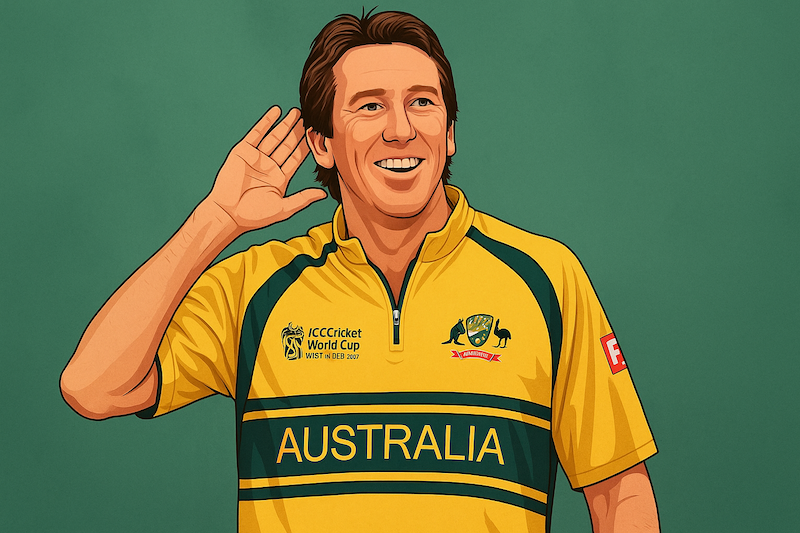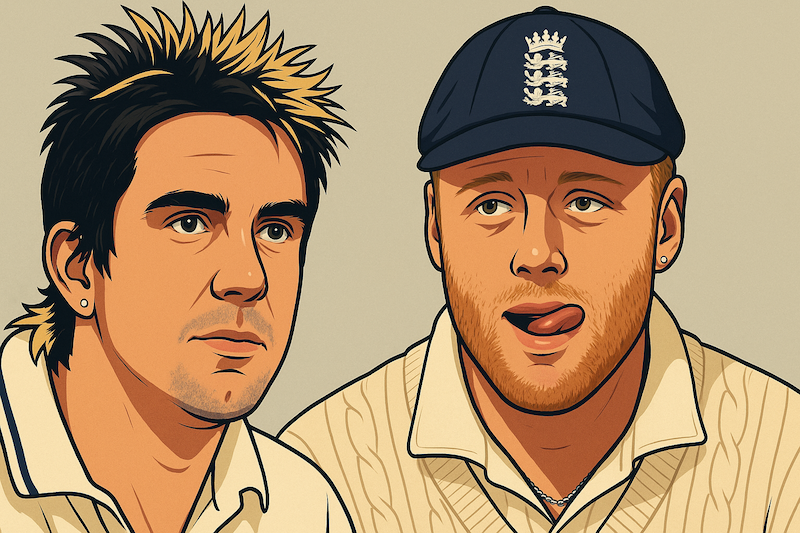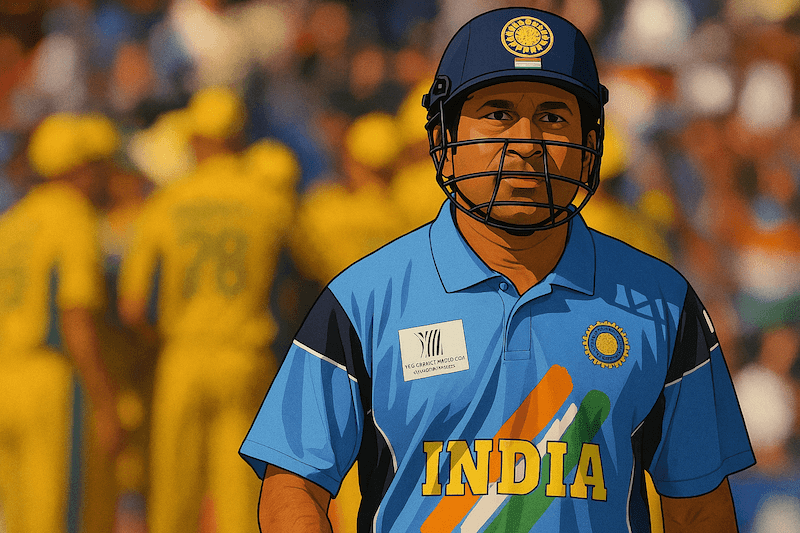
If you followed cricket between 1999 and 2007, one thing was obvious… If your team was up against Australia, it felt like mission impossible. You didn’t go in hoping to win — you went in hoping not to get crushed. They weren’t just the best team in the world. They were a machine: ruthless, disciplined, and hungry every single game.
But what made them so dominant? Was it just talent? Or was there something deeper, something that turned a group of great players into an unstoppable force? Let’s break it down.
The Numbers of a Dynasty
First, let’s look at the numbers, because they’re just ridiculous.
- From 1999 to 2007, Australia won roughly 77% of their Test matches.
- They went on not one, but two separate 16-match Test winning streaks — from 1999 to 2001, and again from 2005 to 2008. Both times, India stopped them.
- They didn’t lose a single Test series at home during this entire era.
- They won three World Cups in a row: 1999, 2003, and 2007.
- They went 29 World Cup games unbeaten.
- In 2003, they strung together a 21-match ODI win streak.
And here’s the craziest part: in the 2003 World Cup, Shane Warne — their biggest match-winner — was banned just before the tournament. But the team didn’t miss a beat. They still steamrolled every opponent.
That’s not luck. That’s a team that didn’t depend on one or two stars. They were all match-winners.
The Killer Mindset
This team had more than just skill. It was their mindset that made them monsters.
They didn’t just play to win, they played to destroy. Even if they had 280 on the board in an ODI, someone in the dressing room would still say: "We're 20 runs short." That was their standard.
Every game, every series — whether against Bangladesh, India, or England — they showed up like it was a World Cup final. They believed in crushing the opponent mentally before the game even started.
Ricky Ponting once told his players before the 2003 World Cup final: "Let’s finish this in the first 10 overs." And they did.
The Intimidation Factor
By the early 2000s, facing Australia wasn’t just a challenge — it was a mental battle before the first ball was even bowled.
Opponents overthought every detail — the pitch, the weather, their game plan. Not for an edge, but to avoid disaster. At the toss, captains hesitated. Batters looked tense even before facing a delivery.
During the 2003 World Cup, Australia bowled out four teams for under 150. That wasn’t coincidence. That was pressure. Former players from England, Pakistan, and South Africa later admitted: Australia's presence alone raised the intensity. Every mistake felt bigger. Every run felt harder.
It wasn’t just about winning. Australia made teams doubt themselves. That’s the power of dominance — it lives not only on the scoreboard, but inside the opponent’s head.
Explore More Stories

Glenn McGrath: Master of Line and Length
Glenn McGrath mastered accuracy over pace, dismantling the world’s best batsmen with discipline and precision. From 563 Test wickets to three World Cups, he became one of cricket’s greatest fast bowlers.

2005 Ashes: The Summer Cricket Became Theatre
The 2005 Ashes was more than just a cricket series. It was a rollercoaster of emotion, courage, and unforgettable moments that brought Test cricket back to life. England’s long wait finally ended, and the world watched history unfold.
Fitness and John Buchanan’s Impact
A huge factor behind their dominance was one man behind the scenes: John Buchanan, Australia’s head coach from 1999 to 2007.
He wasn’t a former Test cricketer. He wasn’t loud. But he brought something new: professionalism, sports science, and high-performance systems.
- Players had custom fitness routines.
- Focus increased on diet, mental conditioning, and strength training.
- Fielding drills became intense, game-like situations.
He introduced concepts like:
- Altitude training
- Team bonding camps
- Scenario-based match simulations
People laughed at first. But results silenced critics. Players became faster, stronger, and mentally tougher. Buchanan wasn’t just a coach. He was a visionary who shaped one of the most elite sporting units cricket has seen.
Ruthless Selection
One reason this team never slipped? No one was bigger than performance.
- Steve Waugh, the captain who won the 1999 World Cup, was dropped from ODIs in 2002.
- Damien Martyn, the hero of the 2003 final, was left out before the 2007 World Cup.
- Even Adam Gilchrist admitted: "You're always one series away from being dropped."
Shane Warne once said: "In the Australian team, you don't get a farewell series. You get a phone call."
The message was clear: earn your spot, keep your spot, or you're out.
The Golden Core
Now let’s talk about the players who built this empire:
- Ricky Ponting — the general. Aggressive, confident, and a match-winner with the bat.
- Glenn McGrath — precision master, relentless in line and length.
- Shane Warne — pure theatre. A chess master with the ball.
- Adam Gilchrist — game-changer. A wicketkeeper and top-order destroyer.
- Matthew Hayden & Justin Langer — the perfect pair. Hayden bullied, Langer wore down.
- Brett Lee & Jason Gillespie — pace and balance. Alongside McGrath, a lethal trio.
This wasn't just a team. It was a squad of match-winners in every role.
Matches That Made History
- 1999 World Cup semi-final vs South Africa — a tie, Donald’s run-out, Australia advanced.
- 2003 World Cup final vs India — Ponting’s 140* humiliated India in Johannesburg.
- 2005 Ashes — England finally beat them. But…
- 2006–07 Ashes — Australia came back with a 5-0 whitewash.
- 2007 World Cup final — Gilchrist’s 149 off 104 sealed a perfect campaign.
These weren’t just wins. They were warnings.
The Finals Mindset
What made Australia truly scary was their ability to peak in big matches. While others got nervous in finals, they got sharper.
From 1999 to 2007, Australia never lost a World Cup knockout match. Three finals, three titles. By 2006, they even cracked the Champions Trophy with two dominant knockout wins.
Their approach was simple:
- Control the first 10 overs.
- Take early wickets.
- Never let the pressure shift.
Against Australia in a final, you weren't just facing a team. You were facing a side that believed it had already won.
The End of an Era
Like every empire, this one ended. Between 2007 and 2008, the core retired: McGrath, Warne, Gilchrist, Langer, Hayden. Australia lost its aura of invincibility just as T20 was changing cricket forever.
By 2008, India beat them in a Test series. It was symbolic — the torch had passed.
Yet, the legacy remains. They redefined professionalism, fielding standards, and mental strength. They inspired a new generation: Kohli, Smith, Stokes — all shaped by watching that dominance.
They didn't just win games. They changed the game.





